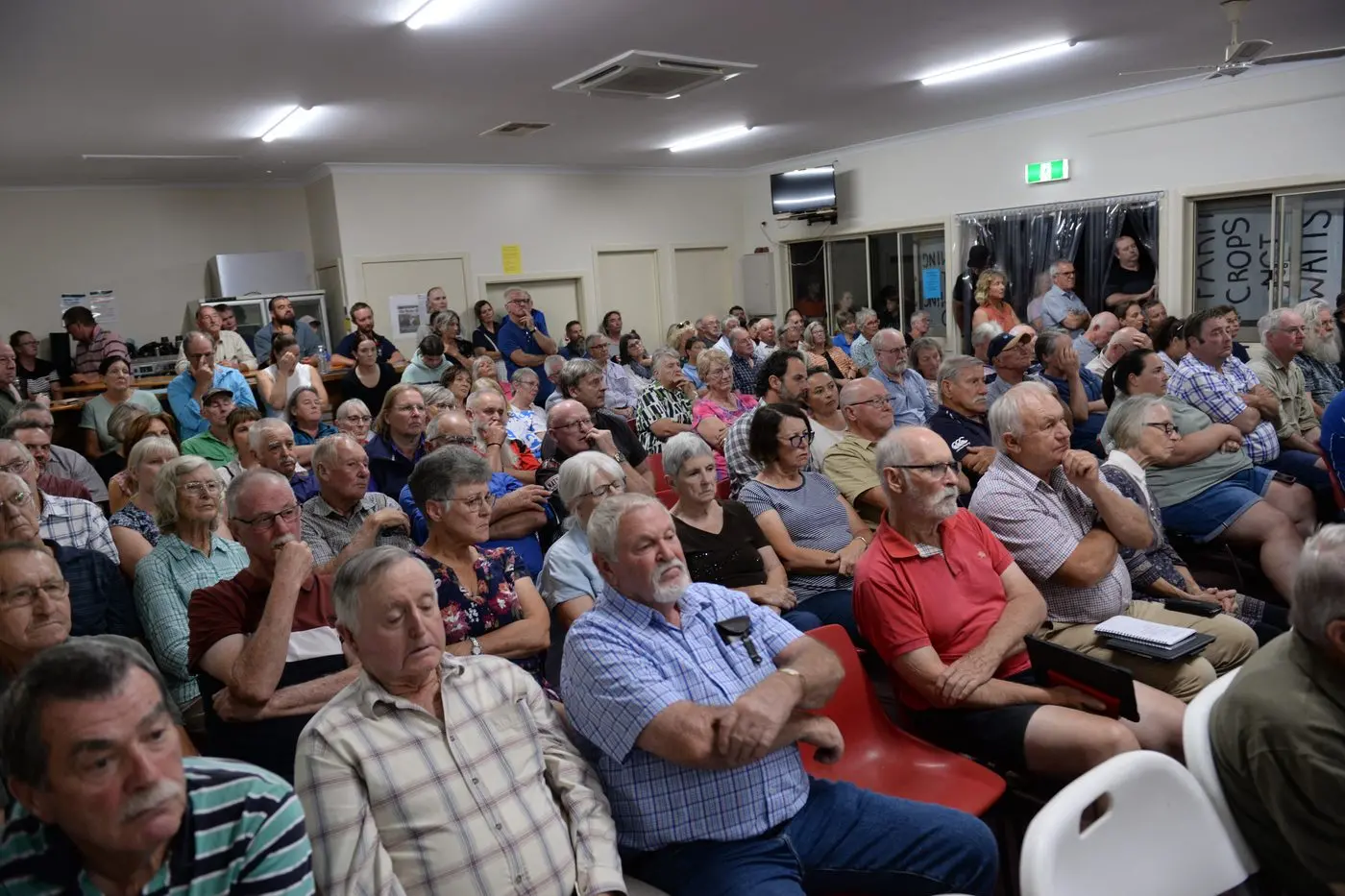PHOTO
THE multi-purpose room at the Dederang Recreation Reserve was again filled to bursting with over 200 attendees at the second community meeting on the Dederang Battery Energy Storage System (BESS) proposal.
Onlookers listened through open windows and stood on the balcony as campaigners and Victorian Nationals Senator Bridget McKenzie spoke against the BESS, followed by questions and statements from attendees.
The meeting follows the sudden emergence of a new BESS proposal near the Dederang substation by solar manufacturer Trina Solar.
Friends of the Kiewa and Alpine Valleys spokesperson Sharon McEvoy said they are campaigning for responsible renewables in appropriate areas, but the location of the proposed installations is not suitable.
“The Dederang BESS and now the Kiewa Valley BESS are sources of concern and uncertainty for our local community and the whole Kiewa Valley,” she said to the crowd.
“We care about the environment, the waterways and the land where we live and work.
“The government is sacrificing the wellbeing of rural communities and natural landscapes, our sense of environments and our agricultural land in the pursuit of short term, clean energy goals.”
Ms McEvoy and fellow campaigner Paul Ingram outlined alleged risks from the proposed installations, including toxic fume emissions in the event of a fire.
“The thermal runaway can still occur when batteries are shut down, and when they are fully discharged,” Mr Ingram said.
“In bushfire situations, chaos can prevail.
“How will local firefighting crews and those who come from other parts of Victoria and New South Wales and beyond help fight bushfires in this area if one both of these BESS are on fire, and the toxic fumes they emit are in the fire front mix.”
Senator McKenzie said installations like the Dederang BESS are being proposed across the state.
“I'm here to tell you that you are not alone, Dederang,” she said.
“It's not just the State Government's insatiable desire for renewable projects, but it is now our Federal Government's insatiable desire for 100 per cent renewables.
“They're refusing to discuss a sensible zero emissions fuel such as nuclear, and so it is all renewables and it is communities like Dederang that are having to pay the price up and down the eastern seaboard.
Senator McKenzie criticised Mint Renewables for their failure to send a representative to the meeting, and asked who would be responsible for cleaning up the site.
“If these guys were miners there are legislative requirements in this country to care for the environment and your social licence, you have to leave the mine site restored,” she said.
“In many cases, it's going to be local communities and the landholder who's left to clean up the mess in 15-20 years’ time.
“The Federal Government is very worried and I hope that the State Government is also starting to reconsider why this was such a good idea in the first place because it's not going to deliver the environmental benefits.”
Both Trina Solar and Mint Renewables opted not to attend the meeting.
A Mint Renewables spokesperson said they want to continue speaking with project neighbours, community members and groups through productive and construction discussions.
In late 2023, Mint reached out to project neighbours and the broader community to share information about the proposed project, invite feedback and offer briefings.
In early February 2024, they held three community information sessions in Dederang about the proposed project.
According to the spokesperson, more than 100 people attended the three sessions, which included a robust question-and-answer session responding directly to questions raised by the Friends of the Kiewa and Alpine Valleys group.
"In response to what we heard during these sessions, we are updating our design and developing mitigation measures to ensure the project is well-informed by local knowledge," they said.
"We will continue to be open and responsive to questions and constructive feedback."
According to Mint Renewables, the BESS would have an operational life of around 20 years.
Decommissioning the site would involve removing all above-ground infrastructure from the site and rehabilitating the land to its original use.
In February, a spokesperson for the renewables company said they are completing detailed environmental assessments to evaluate any potential impacts and develop suitable mitigation measures as part of their planning and environmental approval process for the BESS.
“As part of this, we have engaged a fire and hazard risk technical specialist to provide advice and assess fire and hazard risk at the Dederang site,“ the company said.
“At Dederang, the BESS is located at a significant distance from nearby dwellings, and natural air movement will be sufficient to disperse smoke and gases."
The company spokesperson also said the BESS must comply with the relevant guidelines, standards, and conditions to receive planning approval and operate in accordance with the legislation of the local jurisdiction.
The meeting follows last week’s State Government announcement to remove third-party appeals for renewable energy projects.
In a bid to advance $90 billion worth of developments held up in red tape, Premier Jacinta Allan last Thursday announced renewable energy projects will be eligible for an accelerated planning pathway under the Development Facilitation Program (DFP).
Under the change, all new renewable projects in Victoria will be treated as a “significant economic development”, removing the planning panel process and third-party appeals at Victorian Civil and Administrative Tribunal (VCAT) and opening a pathway for decisions to be made on applications within four months.





